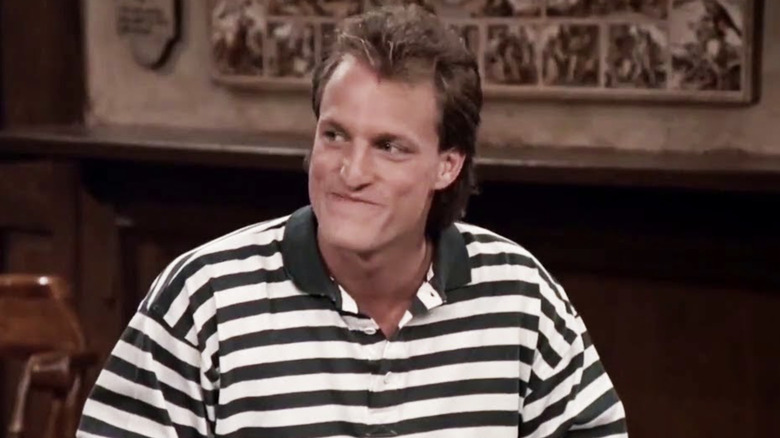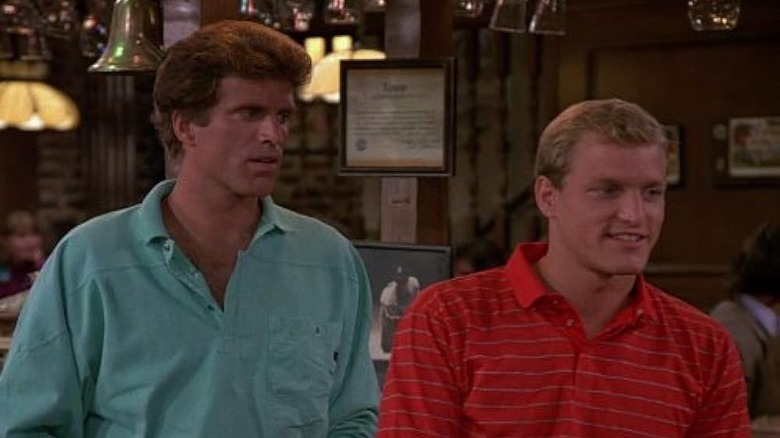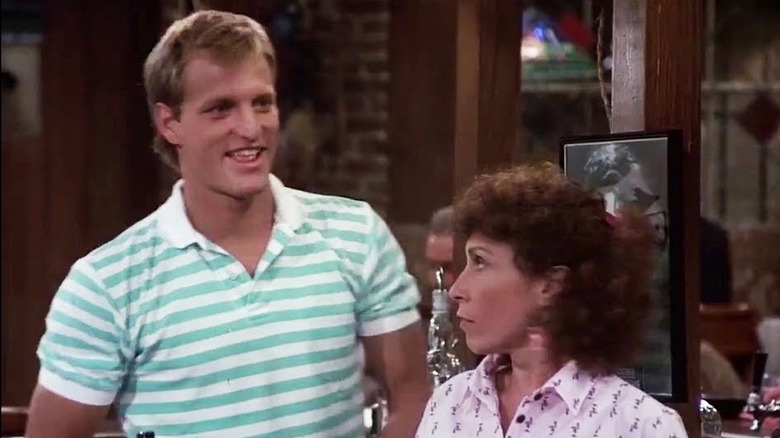Woody Harrelson Won His Role In Cheers By Breaking Down In Tears
"Cheers" had just found its Nielsen ratings footing when the sitcom was dealt an unexpectedly tragic blow: Nicholas Colasanto, who'd become the heart of the series as kind-hearted bartender "Coach" Ernie Pantusso, died at the age of 61 of a heart attack.
Of the main cast, Colasanto might've been the most irreplaceable. He provided the show its first heartbreaking moment in the season 1 episode "Coach's Daughter," where he struggles to convince his only child (Allyce Beasley) to not marry her boor of a fiancé. From that moment forward, the writers deployed Coach as a lovably addled fount of accidental wisdom; though irreparably concussed by taking too many baseballs to the noggin during his major league career, the goofball always came through when it counted.
And suddenly, before the conclusion of the series' pivotal third season, he was gone.
"Cheers" still had a deep-bench ensemble with Sam, Diane, Carla, Norm and Cliff, but the writers needed that sweet-natured foil to balance out the self-interested buffoonery of the other characters. This seemed impossible until an impossibly talented young actor gave the audition of a lifetime.
Woody turns on the waterworks
In an oral history timed to the 25th anniversary of the "Cheers" series finale, the writers revealed that NBC was eager to replace Coach with a younger character who possessed his predecessor's gentle qualities. Writer Ken Levine agreed with this approach. "Having such a 'dumb' character (from too many head concussions in baseball) allows you to get exposition out," he said. "When you explained things to Coach, you were really explaining it to the audience."
They thought they'd found their man, but at the end of the audition process the show's casting director asked them to look at one last actor. This was Woody Harrelson, who, according to Peter Casey, gave them something they didn't know they were looking for.
"This guy walks in wearing basketball shorts, a T-shirt and unlaced high-tops. He looked like he could be trouble if you crossed him. And then he read and caught everyone's attention in that room by doing one thing that nobody else did. When Sam told him that Coach died, he teared up and started to cry. You're sitting there going, 'This is a comedy audition,' but then he does that and it's like, 'Whoa, he can really act.'"
They backed off their first choice, hired Harrelson, and were rewarded with one of the great sitcom performances.
Bringing the Midwest to a Boston bar
Shelley Long, who would leave the series to pursue movie stardom two seasons later, explained Harrelson's appeal thusly:
"The way Woody played Woody was he thought the best of everyone. He didn't think Carla was mean or Cliff talked too much. That was one of the things that made his performance so luminous."
Harrelson spent the first 12 years of his life in Texas, but he spent his formative years in Ohio and Indiana. The writers picked up on this, and wrote Woody as a wide-eyed naif of the American Midwest. This beautifully complemented the Bostonian cynicism of the other characters. They were every bit as baffled by Woody as Coach, but they also occasionally played the role of mentor to this puppy dog of a kid. Woody made the Cheers patrons nicer. Even the tough-talking Carla was impervious to his childlike charm.
Harrelson's stardom arrived overnight. He earned five Primetime Emmy nominations for his portrayal of Woody, and won Outstanding Supporting Actor in a Comedy Series in 1989. That's the least he deserved for saving "Cheers."


